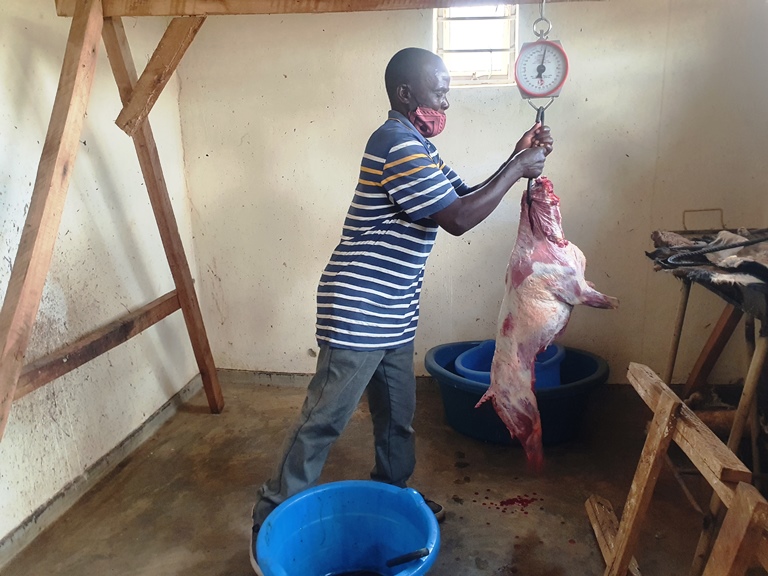Livelihoods improve with goat keeping
Violet Banda, a goat keeper from Mkwela Village, Traditional Authority (T/A) Kayembe in Dowa, was struggling to make ends meet before she started rearing goats.
The mother of five, who also looks after two orphans, said it was tough for her family to send all the children to school with the little they earn as maize traders.

When one of the orphans she adopted, a Form Three student at Nambuma Secondary School, was almost withdrawn from school for outstanding tuition fees, the goats offered a timely lifeline. She sold one of the goats to pay the fees.
The family received four goats in 2020. through the enhancing the Goat Value Chain project,.The goats have now reproduced to seven and three of them are gestating.
But the goats offer a lot more return on investment other than the financial gain. Banda explained that they obtain nutritional value in chevon (goat meat) as well as manure from the droppings.
“We dig pits where we keep the droppings and other household wastes, and later mix them. This forms the best manure for both our backyard gardens and farm fields,” she said.
In the same district, Dorothy Ntunga from Kamphangale Village, T/A Mkukula is one of the 50 beneficiaries of goats in her area.
A year on, she is one of the members of Chamwala Club who have sold some of their goats to address their pressing socio-economic needs.
“We sold the goats as a club to Kalimanja Goat Cooperative, and we each used the funds according to our needs. Some people bought maize, others got fertiliser and some got more goats.
“Some have even paid school fees for their children. I rented a piece of land where I will cultivate soya beans this season,” said Ntunga, who is also the club’s secretary.
As the goats under the Goat Value Chain Project continue to reproduce, the beneficiaries’ livelihoods and communities will also improve.
This will lead to increased goat ownership, access to profitable markets and capacity building in climate-friendly goat management practices, which the project set out to accomplish.
The Goat Value Chain Project is being implemented by the Small Producers Development and Transporters Association (Sprodeta) with support from Norwegian Church Aid (NCA)/DanChurchAid (DCA).
In an interview, Sprodeta monitoring and evaluation officer Anna Chikoko said the goat distribution has helped farmers to sell the goats and raise income to support their basic needs, apart from the droppings they use as fertiliser in their backyard gardens.
She urged farmers to continue following the goat management practices to have more goats, which they can then sell at a profit and improve their livelihoods.
Sprodeta field officer Harrison Mkandawire agreed that they have linked goat farmers from T/A Mkukula with Kalimanja Goat Cooperative in Madisi, which apart from rearing their own goats, also buys some to sell the meat, to give them access to a reliable market.
The cooperative’s chairperson Frank Kalumo, a father of two and a tobacco farmer who now has 14 goats from the ones he received in 2019, said they bargain better as a cooperative.
“The goats fetch better prices when we sell as a cooperative as opposed to doing it individually as vendors offer much lower prices. They can bargain to as low as K18 000 for a goat, which is worth K25 000. The same applies when buying goats from others for our meat sales. We buy them at better prices as a cooperative,” he said.
Kalimanja Goat Cooperative, which has 175 members, was formed in 2019 to raise goats for chevon.
They started with initial shares of K20 000 per member, raising about K3.5 million in capital. Unfortunately, some unprincipled members of the executive committee misappropriated the funds, leaving the cooperative struggling.
“They were supposed to repay K1.2 million with which we would recapitalise the business. However, only K640 000 has been repaid by five of the members and four are yet to repay the K560 000.
“We would like to be buying more goats at one go so that we at least buy and slaughter 10 goats per day, but we are still far from that,” said Kalumo.
When Kalumo and team took over the committee membership in January, the cooperative was as good as dead, with no funds to its name.
“We are still trying to revamp it. Things are moving, but at a slower pace because of insufficient funds,” he said.
Still reeling from the financial handicaps, the cooperative buys much fewer goats per month than they initially planned. In January 2020, for instance, they bought eight goats at K156 000, from which they realised K187 000.
With six goats bought in February at K126 000, the group earned K155 000 and in March, they bought eight goats at K183 000 and had K234 000 in returns.
But overall, NCA/DCA programme officer for climate smart economic empowerment Asimenye Chitika was pleased that the project has helped the beneficiaries increase their incomes while simultaneously enhancing their resilience to the adverse effects of climate change.
The group plants trees as part of their collective efforts to conserve the environment.
“First, the beneficiaries own goats and manage them since they were taken through all the capacity building activities to beef up their knowledge of livestock production.
“Second, the beneficiaries were taught how grazing goats can negatively affect the environment and how their contribution through tree planting of fodder and fruit trees will benefit the environment and their surrounding communities,” Chitika explained.
Apart from that, she said the project looked at access to markets for the goat keepers, both for live goats and goat products such as chevon, skin, and milk.





